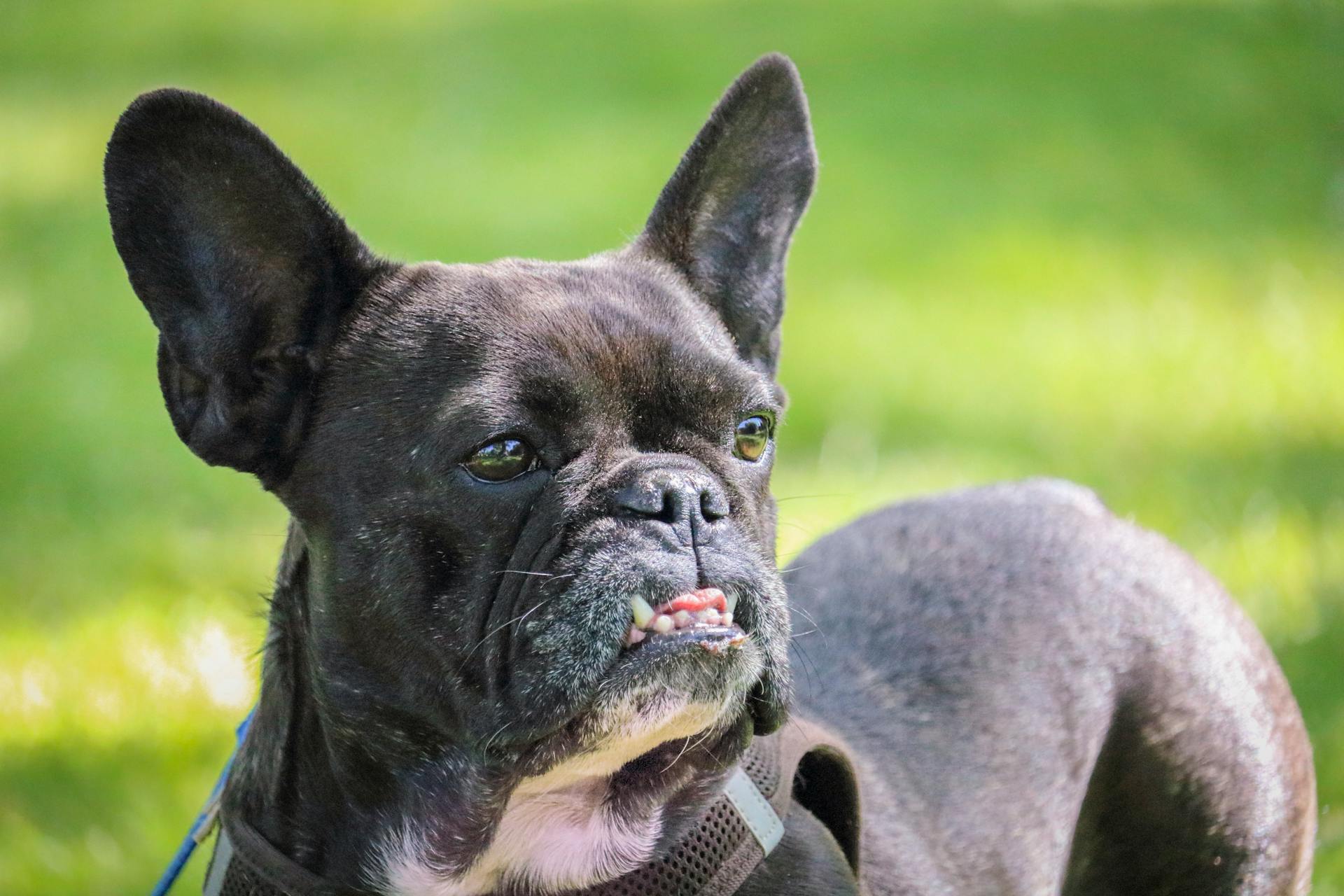
French Bulldogs have a unique history that may contribute to their health issues. The breed was developed from a small group of dogs in England, which can make them more prone to inherited health problems.
The American Kennel Club (AKC) recognizes the French Bulldog as a distinct breed, but their origins are rooted in the English Bulldog and the now-extinct Old English Bulldog. This limited gene pool can increase the risk of inherited health issues.
French Bulldogs are often brachycephalic, meaning they have a short, flat face, which can lead to breathing difficulties. This physical characteristic is a result of selective breeding for a specific appearance.
Their compact body and short legs also make them more susceptible to joint issues and spinal problems.
You might like: Most Expensive Bulldog Breed
French Bulldogs and Health Issues
French Bulldogs are prone to a range of health issues due to their unique body shape. Short-nosed breeds like French Bulldogs experience more health issues than other dogs.
The exaggerated look of the French Bulldog's body exacerbates their health problems. Many French Bulldogs cannot give birth naturally and have to deliver puppies by cesarean section.
Studies show that short-nosed breeds experience more health issues than other dogs, including eye, spine, and skin problems. Some veterinarians argue that the altered body shape of French Bulldogs makes them more susceptible to these issues.
The national club for French Bulldogs defines a "breed standard" that requires the nose to be "extremely short." In response to criticism, the U.K.'s Kennel Club amended its French Bulldog standard to specify that the dog's muzzle should be "well-defined."
Common Health Issues in French Bulldogs:
- Eye problems
- Spine problems
- Skin problems
- Difficulty giving birth naturally
Bulldog Breeding Controversy
Bulldogs, like French bulldogs and pugs, are prone to serious health issues due to their unique body shape.
Some purebred dog groups, including the American Kennel Club, oppose legislation that targets specific breeds with health problems, instead advocating for education and best practices.
Opponents of the legislation argue that it's extremist and will put breeders in a defensive posture.
Breeders are being asked to have their dogs checked for breathing problems by a veterinarian before breeding them, with knowingly breeding dogs with serious breathing issues resulting in a civil penalty.
The bill aims to ensure that breeding practices are done ethically, prohibiting the breeding of two individual animals with identical deformities that cause suffering.
However, scientific studies show that eliminating health problems through breeding is challenging due to the level of inbreeding within some dog breeds.
Today's purebred bulldogs originated from a small group of founding animals, meaning there may not be enough genetic diversity within the current population to breed out problematic traits.
Many veterinarians argue that the exaggerated look of the dog's body exacerbates their health problems.
Some health issues experienced by short-nosed breeds like bulldogs, pugs, and French bulldogs include eye, spine, and skin problems.
Because of their altered body shape, many bulldogs cannot give birth naturally and have to deliver puppies by cesarean section.
The national club for each breed defines a "breed standard", which controls the look of the dog, including the nose being "extremely short" for French bulldogs.
Expand your knowledge: Tall Bulldog Breed
French Bulldog Health Study Reveals Devastating Impact

French Bulldogs are prone to a range of health issues due to their unique breeding history. The most significant contributor to these problems is the breed's inbreeding, which has led to a higher incidence of genetic disorders.
The French Bulldog Health Study found that 40% of French Bulldogs suffer from brachycephalic syndrome, a condition that causes breathing difficulties and can lead to serious complications. This is largely due to their flat face and short nasal passages.
Respiratory problems are just the tip of the iceberg, as French Bulldogs are also at risk for heart issues, with a study showing that 20% of the breed has a heart murmur. This can lead to life-threatening conditions such as congestive heart failure.
Spinal issues are another major concern for French Bulldogs, with a study revealing that 30% of the breed suffers from spinal problems, including herniated discs and spinal stenosis. This can cause chronic pain and even paralysis.
The combination of these health issues means that French Bulldogs require regular veterinary check-ups and a strict exercise routine to maintain their quality of life.
Alternative to Outbreeding
If you're concerned about the potential health risks associated with inbreeding in French Bulldogs, there are alternative breeding approaches to consider.
One such approach is linebreeding, which involves breeding dogs that are closely related but not as closely as in inbreeding. This can help preserve desirable traits while reducing the risk of inherited health problems.
Linebreeding involves selecting dogs that are related to the desired traits, but not so closely that it increases the risk of inherited health problems.
By using linebreeding, breeders can create a more diverse gene pool while still maintaining the characteristics that make French Bulldogs so unique.
This approach can also help reduce the incidence of inherited health problems, such as respiratory issues and joint problems, that are common in inbred French Bulldogs.
Another alternative is outcrossing, which involves breeding French Bulldogs with dogs from other breeds or with a different ancestry.
Outcrossing can help introduce new genetic material into the breed, reducing the risk of inherited health problems and increasing the overall diversity of the gene pool.
This approach can also help preserve the characteristics that make French Bulldogs so endearing, while reducing the risk of inherited health problems.
On a similar theme: Why Do French Bulldogs Fart so Much
Frequently Asked Questions
What two breeds make up a French Bulldog?
The French Bulldog is a result of crossing bulldogs with terriers and pugs. This unique combination led to the breed's distinctive compact size and charming appearance.
What is the inbreeding coefficient of a French Bulldog?
The average inbreeding coefficient of a French Bulldog is around 28%, which is equivalent to a full sibling cross. This high inbreeding coefficient raises concerns about the breed's genetic health.
Sources
- https://www.healthday.com/health-news/general-health/12-16-highly-inbred-french-bulldogs-face-higher-odds-for-20-health-issues-2656019916.html
- https://www.newsweek.com/french-bulldog-health-probelms-vet-study-breathing-skin-nostrils-1658722
- https://www.npr.org/2024/03/27/1241072309/french-bulldogs-pugs-breed-breathing-health
- https://theconversation.com/how-to-save-inbred-short-faced-dogs-such-as-pugs-and-bulldogs-from-poor-health-63341
- https://rspcavic.org/learn/7-health-problems-caused-by-inbreeding/
Featured Images: pexels.com


